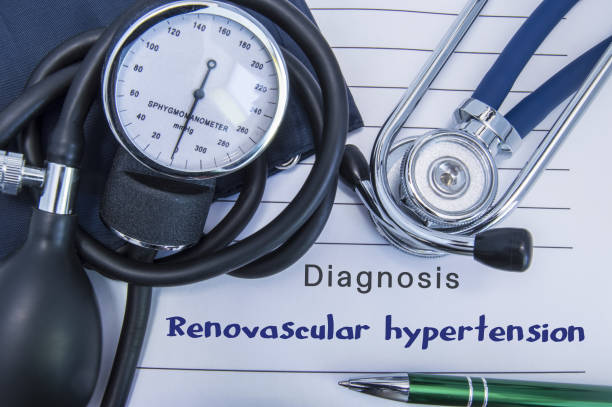The #1 Rated Blood Sugar Formula
What is Renovascular Hypertension?

Causes
Renal artery stenosis is a narrowing or blockage of the arteries that supply blood to the kidneys.
The most common cause of renal artery stenosis is a blockage in the arteries due to high cholesterol. This problem occurs when a sticky, fatty substance called plaque builds up on the inner lining of the arteries, causing a condition known as atherosclerosis.
When the arteries that carry blood to your kidneys become narrow, less blood flows to the kidneys. The kidneys mistakenly respond as if your blood pressure is low. As a result, they release hormones that tell the body to hold on to more salt and water. This causes your blood pressure to rise.
Risk factors for atherosclerosis:
- High blood pressure
- Smoking
- Diabetes
- High cholesterol
- Heavy alcohol use
- Cocaine abuse
- Increasing age
Symptoms
People with renovascular hypertension may have a history of very high blood pressure that is hard to bring down with medicines.
Symptoms of renovascular hypertension include:
- High blood pressure at a young age
- High blood pressure that suddenly gets worse or is hard to control
- Kidneys that are not working well (this can start suddenly)
- Narrowing of other arteries in the body, such as to the legs, the brain, the eyes and elsewhere
- Sudden buildup of fluid in the air sacs of the lungs (pulmonary edema)
- Bad headache
- Nausea or vomiting
- Confusion
- Changes in vision
- Nosebleeds
Exams and Tests
The health care provider may hear a "whooshing" noise, called a bruit, when placing a stethoscope over your belly area.
The following blood tests may be done:
- Cholesterol levels
- Renin and aldosterone levels
- BUN - blood test
- Creatinine - blood test
- Potassium - blood test
- Creatinine clearance
- Angiotensin converting enzyme (ACE) inhibition renography
- Doppler ultrasound of the renal arteries
- Magnetic resonance angiography (MRA)
- Renal artery angiography
Treatment
High blood pressure caused by narrowing of the arteries that lead to the kidneys is often hard to control.
One or more medicines are needed to help control blood pressure. There are many types available.
- Everyone responds to medicine differently. Your blood pressure should be checked often. The amount and type of medicine you take may need to be changed from time to time.
- Ask your provider what blood pressure reading is right for you.
- Take all medicines the way your provider prescribed them.
- Eat a heart-healthy diet.
- Exercise regularly, at least 30 minutes a day (check with your doctor before starting).
- If you smoke, quit. Find a program that will help you stop.
- Limit how much alcohol you drink: 1 drink a day for women, 2 a day for men.
- Limit the amount of sodium (salt) you eat. Aim for less than 1,500 mg per day. Check with your doctor about how much potassium you should be eating.
- Reduce stress. Try to avoid things that cause stress for you. You can also try meditation or yoga.
- Stay at a healthy body weight. Find a weight-loss program to help you, if you need it.
- Severe narrowing of the renal artery
- Blood pressure that cannot be controlled with medicines
- Kidneys that are not working well and are becoming worse
Possible Complications
If your blood pressure is not well controlled, you are at risk for the following complications:
- Aortic aneurysm
- Heart attack
- Heart failure
- Chronic kidney disease
- Stroke
- Vision problems
- Poor blood supply to the legs
When to Contact a Medical Professional
Call your provider if you think you have high blood pressure.
Call your provider if you have renovascular hypertension and symptoms get worse or do not improve with treatment. Also call if new symptoms develop.
Prevention
Preventing atherosclerosis may prevent renal artery stenosis. Taking the following steps can help:
- Lose weight if you are overweight.
- Ask your provider about your smoking and alcohol use.
- Control your blood sugar if you have diabetes.
- Make sure your provider is monitoring your blood cholesterol levels.
- Eat a heart-healthy diet.
- Get regular exercise.
Diet for Lowering Blood PressureLifestyle Modifications to Reduce Blood PressureMalignant Hypertension Complicationsrenovascular hypertensionRenovascular Hypertension ComplicationsRisk factors for atherosclerosisSymptoms of renovascular hypertensionTreatment for Renovascular HypertensionTreatment of high blood pressure






